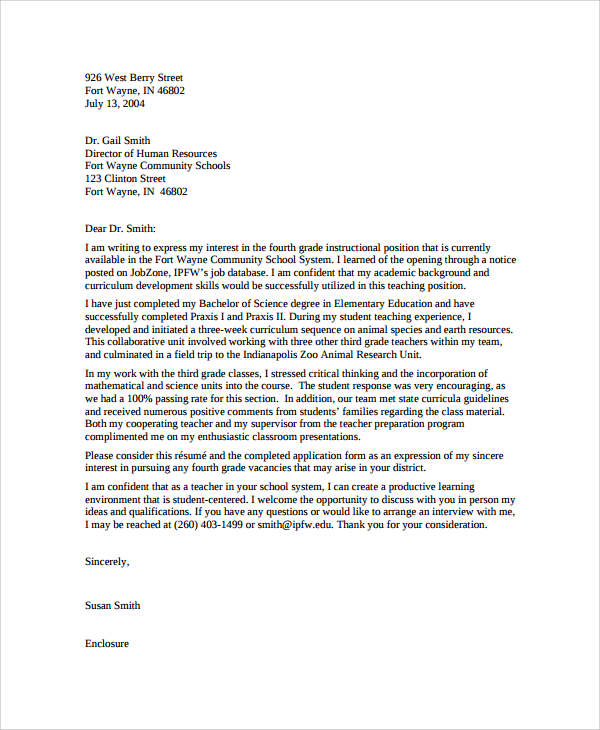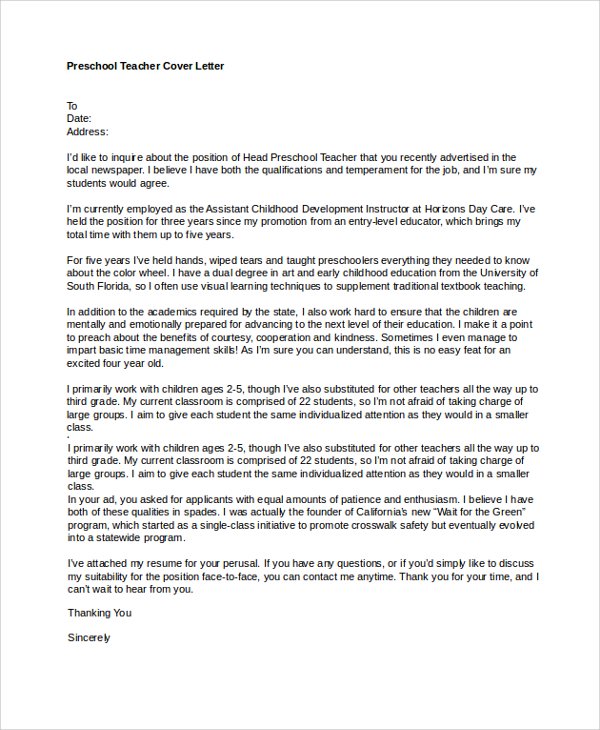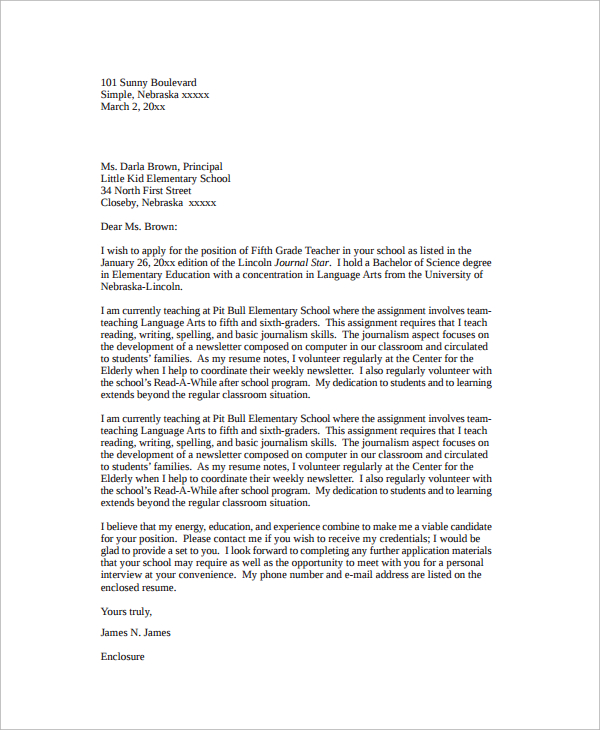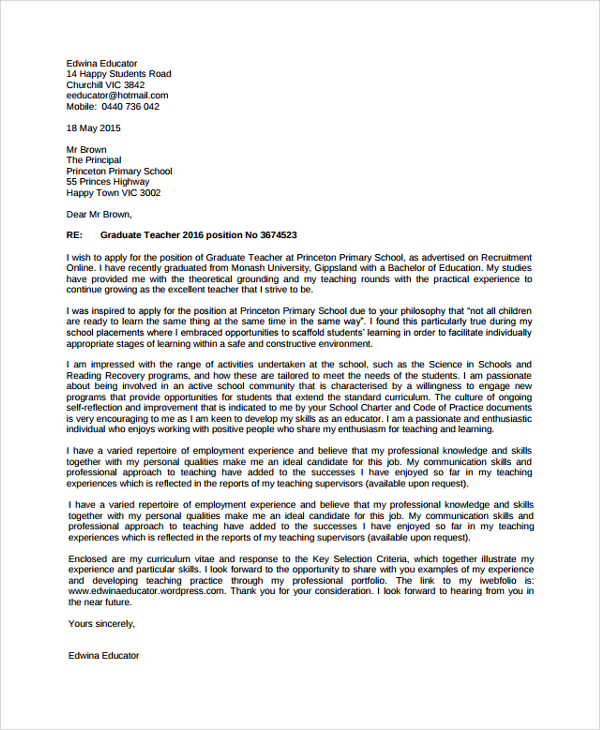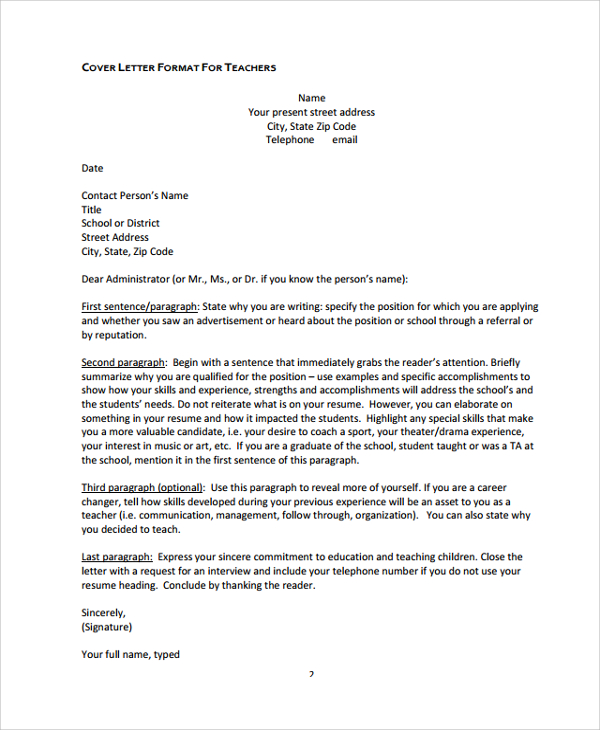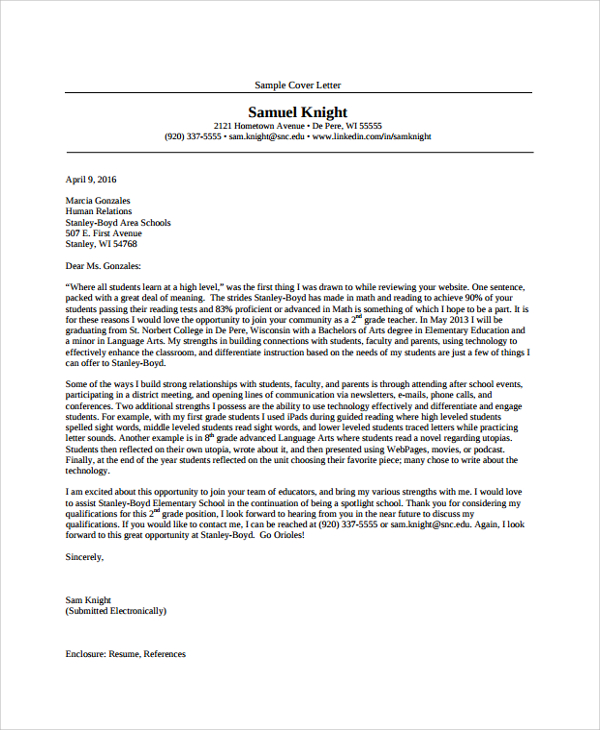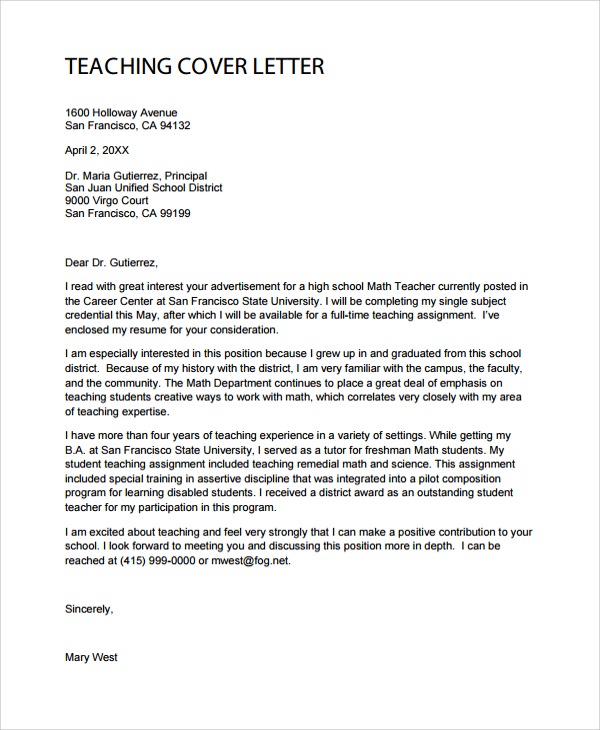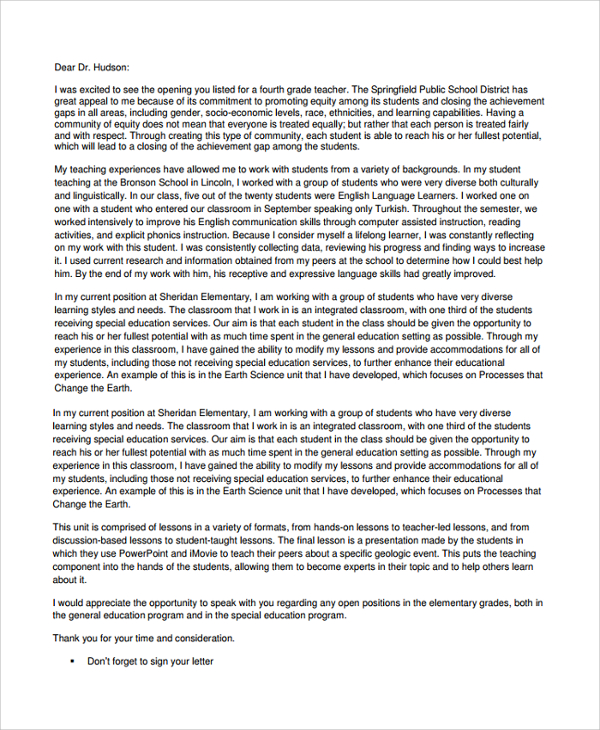Being a teacher is an honorable career to have. You should be proud of it. Your line of work as a teacher isn’t just a job. It’s also your calling in life—to guide the youth and contribute in their journey to become better and knowledgeable individuals. Even if your unemployed right now or currently on hiatus, you’re still a teacher for as long as you hold your license. So if you ever wish to be part of a faculty team again, you’re very much welcome to use our new teacher cover letter examples. Use them as your template, pair them with our teacher resume templates, and apply to a school of your choice. You’ll be a faculty member again in the next school year.
Free Teacher Cover Letter
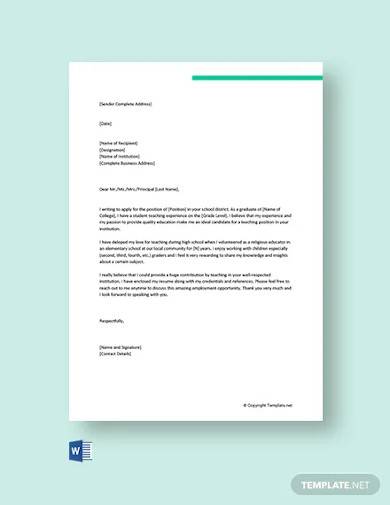
Free Science Teacher Cover Letter Template
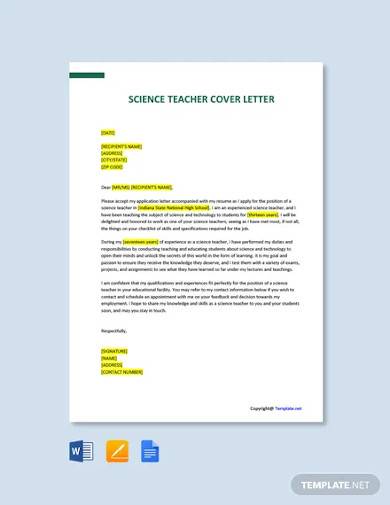
Free Secondary Teacher Cover Letter Template
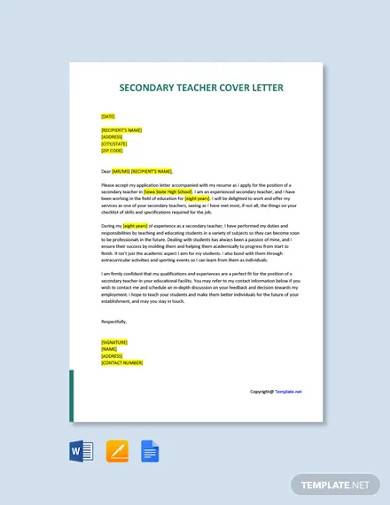
Free Drama Teacher Cover Letter Template
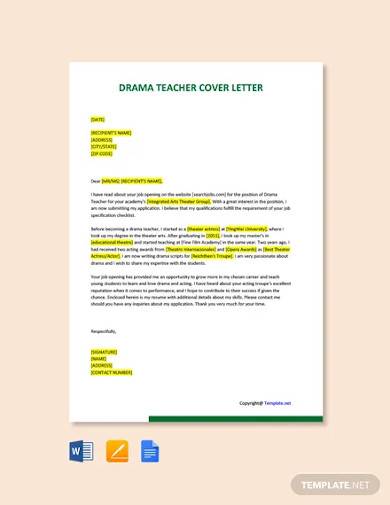
Free Geography Teacher Cover Letter Template
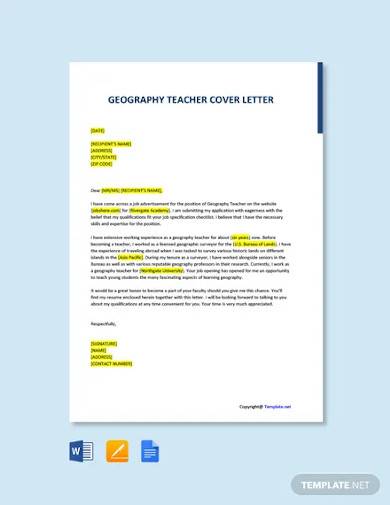
Elementary Teacher Cover Letter
Preschool Teacher Cover Letter
Art Teacher Cover Letter
Graduate Teacher Cover Letter
Cover Letter Format for Teacher
Early Childhood Teacher Cover Letter
High School Teacher Cover Letter
Sample Teacher Cover Letter
The Four Parts of a Teacher Cover Letter
A cover letter could be the difference between getting the job and not getting the job. Some employers read it thoroughly to assess a job candidate’s competency for the position. Even more so among school employers, particularly principals and headmasters. Just like viewing a resume, they usually go over the tiniest details of a cover letter to determine if the applicant is truly a capable educator. Because of that, you need to make sure that your teacher cover letter has these four parts.
Contact Information
Every standard formal letter should always have the sender’s contact information. That said, make sure to include your contact information. That includes your full name, phone number, email address, and home address. This enables an employer to know where you’re from. Plus, he or she will have a direct means of contacting you if you’re eligible for a job interview.
Formal Salutation and Greeting
Cover letters have to begin on a positive note through formal salutation and greeting. This is the usual “Dear Mr.,” “Dear Ms.,” or “Dear Dr.” Always address the employer formally to show a good first impression. It shows that you’re a true professional.
Info of Your Qualifications
In the cover letter’s body, you have to elaborate on our qualifications. Yes, they’re already in your resume, but you need to summarize them in your cover letter for the employer. You can talk about your experience, achievements, educational background, and certificates. But before that, don’t forget the teaching job description you’re applying for. Make sure to state whether you’re applying as a middle school teacher, kindergarten teacher, preschool teacher, special education teacher, high school teacher, elementary teacher, etc.
Closing Remarks and Signature
At the latter part of your cover letter or the last paragraph is where you should begin your closing remarks. Express your gratitude to the employer for the time he or she spent reading your letter. Tell him or her that your schedule is free for a job interview. Conclude your cover letter with a formal closing such as “Respectfully Yours,” “Yours Truly,” and “Sincerely.” And lastly, affix your signature as the job applicant and letter sender.
Is a Cover Letter Necessary?
The question of whether a cover letter or job application letter is necessary or not has one answer: it depends on the employer. On some employer’s job posts, they require applicants to submit a cover letter, while others don’t. But for us, even if the employer doesn’t ask for a cover letter, submitting one anyway is better because it adds more value to your application. That way, the employer will see that you’re eager and passionate about filling his or her job vacancy.
Tips In Writing a Decent Teacher Cover Letter
Knowing the four parts of a cover letter isn’t enough to come up with a compelling one. When you write a cover letter, try to make it unique and interesting. Whether you’re writing a first year teacher cover letter, an elementary teacher cover letter, a high school teacher cover letter, or a substitute teacher cover letter, these tips below will help you make it engaging.
Show Some of Your Personality
It’s important for cover letters not to sound robotic. As if the employer is reading a letter written by a suboptimal AI software instead of a genuine human. When you write a cover letter, show your personality in writing it. Use your unique writing voice and tone to establish a social connection with the employer. Try to avoid the orthodox phrases of most cover letters. Such phrases make your message sound dull and unengaging.
Highlight What You Can Do Instead of What You Can Get
This tip is very crucial if you’re an entry level teacher with no experience. Many entry level applicants make the mistake of emphasizing what the company can do for their career instead of what they can do for it. Take note that what employers look for in a cover letter is the latter. So in your case, highlight more on how you can help the school despite not being an experienced teacher.
Keep Your Letter Short
A cover letter is not a story-of-your-life type of letter. It’s all about your career as a teacher and none other. So don’t sprinkle any topics in your cover letter that adds nothing to your chances of landing the job. Limit it in at least 300 to 500 words—enough for a 3-minute read—and focus only on your teaching career. Employers are busy people. So keeping your letter short is a way of being considerate and professional.
Avoid Using High Falutin Words
You might think that using uncommon words makes you sound smart and impressive, but they don’t. They make your cover letter sound pretentious, and that can put off some employers. With that in mind, just use simple vocabulary when you write it—like having a normal conversation with the employer.
What should I not include in my cover letter?
There are many things we can mention on what to exclude in a cover letter. But, we’ll show you the most crucial ones below:
- Typos and grammatical errors
- Irrelevant topics
- Wordy paragraphs
- Salary demands
- Personal expectations about the job
- Criticisms of previous employers and companies
Is there a difference between a cover letter and a job application letter?
Yes, there is. A cover letter serves as a written summary of a resume and an invitation for an employer to read it. Whereas, a job application letter stands on its own as a letter from a candidate applying for a job. However, both letters serve a similar purpose—to convince an employer of an applicant’s competency.
What is the most suitable greeting or salutation for a cover letter?
The best salutation for a cover letter would be “Hello” and “Dear.” They both sound professional, and they make the letter sound welcoming.
Based on a report from the US Bureau of Labor and Statistics, there is a projected 1,076,100 teaching job openings between the years 2014 to 2024. That’s quite a lot, indeed. With that said, there are plenty of teaching job opportunities for you out there. Go ahead and take them with the help of our teacher cover letter samples!
Related Posts
FREE 9+ Non-Engagement Letter Samples in PDF | MS Word
School Excuse Letter Samples & Templates
Permission Request Letter Samples
FREE 3+ New Hire Announcement Letter Samples in PDF | MS Word
Endorsement Letter
Agreement Letter
Response Letter
Visa Invitation Letter
Passport Authorization Letter
11 FREE Nomination Letter Samples & Templates
10 FREE Debt Verification Letter Samples & Templates
Advertising Proposal Letter
Service Letter
Distributor Letter of Appointment
Product Proposal Letter

